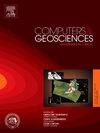ScoreInver:基于评分机制的三维地震阻抗反演
IF 4.4
2区 地球科学
Q1 COMPUTER SCIENCE, INTERDISCIPLINARY APPLICATIONS
引用次数: 0
摘要
近年来,深度学习的引入大大推进了地震阻抗反演(SII)领域的发展。然而,现有的方法通常严重依赖于大量昂贵的测井资料,限制了它们的广泛适用性,特别是在成熟或合成数据之外的情况下。为了在基于深度学习的SII研究中减少对测井的依赖,本文提出了一种基于半监督学习中的伪标记策略的3D数据驱动SII方法,称为ScoreInver框架。ScoreInver框架的核心在于Scorer的设计和训练,Scorer可以精确地从地震数据中选择高质量的伪标签,从而提高数据利用率和提取地质信息,同时最大限度地减少对大量测井资料的需求。这个框架是高度通用的,能够无缝集成到各种半监督学习架构中。实验结果表明,当只使用9口井作为合成数据的训练样本时,基于ScoreInver框架的半监督学习架构明显优于传统的监督学习方法,结构相似指数(SSIM)提高了3.3%,均方误差(MSE)降低了29.1%。此外,对现场数据的测试表明,ScoreInver框架的应用产生了更加稳健和可靠的结果,进一步验证了其在实际勘探环境中的有效性和实用性。本文章由计算机程序翻译,如有差异,请以英文原文为准。
ScoreInver: 3D seismic impedance inversion based on scoring mechanism
In recent years, the introduction of deep learning has significantly advanced the field of seismic impedance inversion (SII). However, existing methods generally rely heavily on large volumes of expensive well logs, limiting their broader applicability, particularly in scenarios beyond mature or synthetic data. To reduce the dependency on well logs in deep learning-based SII research, this paper proposes a 3D data-driven SII approach based on the pseudo-labeling strategy in semi-supervised learning, termed the ScoreInver framework. The core of the ScoreInver framework lies in the design and training of a Scorer, which can precisely select high-quality pseudo-labels from seismic data, thereby enhancing data utilization and extracting geological information while minimizing the need for extensive well logs. This framework is highly versatile, capable of seamless integration into various semi-supervised learning architectures. Experimental results demonstrate that, when using only 9 well logs as training samples on synthetic data, the semi-supervised learning architectures based on the ScoreInver framework significantly outperforms traditional supervised learning methods, with improvements of 3.3% in Structural Similarity Index (SSIM) and a reduction of 29.1% in Mean Squared Error (MSE). Moreover, tests on field data reveal that the application of the ScoreInver framework yields more robust and reliable results, further validating its effectiveness and practicality in real-world exploration environments.
求助全文
通过发布文献求助,成功后即可免费获取论文全文。
去求助
来源期刊

Computers & Geosciences
地学-地球科学综合
CiteScore
9.30
自引率
6.80%
发文量
164
审稿时长
3.4 months
期刊介绍:
Computers & Geosciences publishes high impact, original research at the interface between Computer Sciences and Geosciences. Publications should apply modern computer science paradigms, whether computational or informatics-based, to address problems in the geosciences.
 求助内容:
求助内容: 应助结果提醒方式:
应助结果提醒方式:


